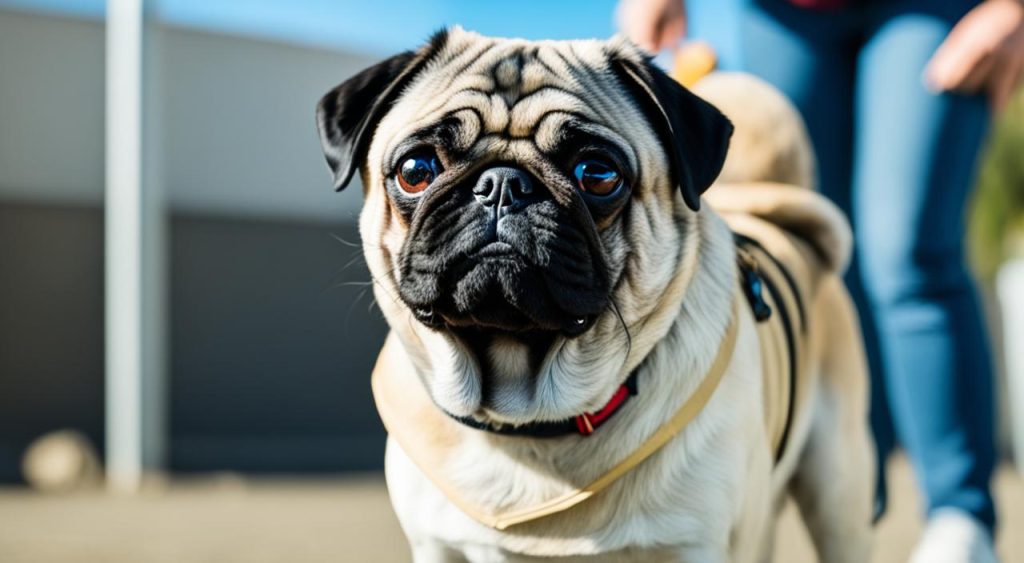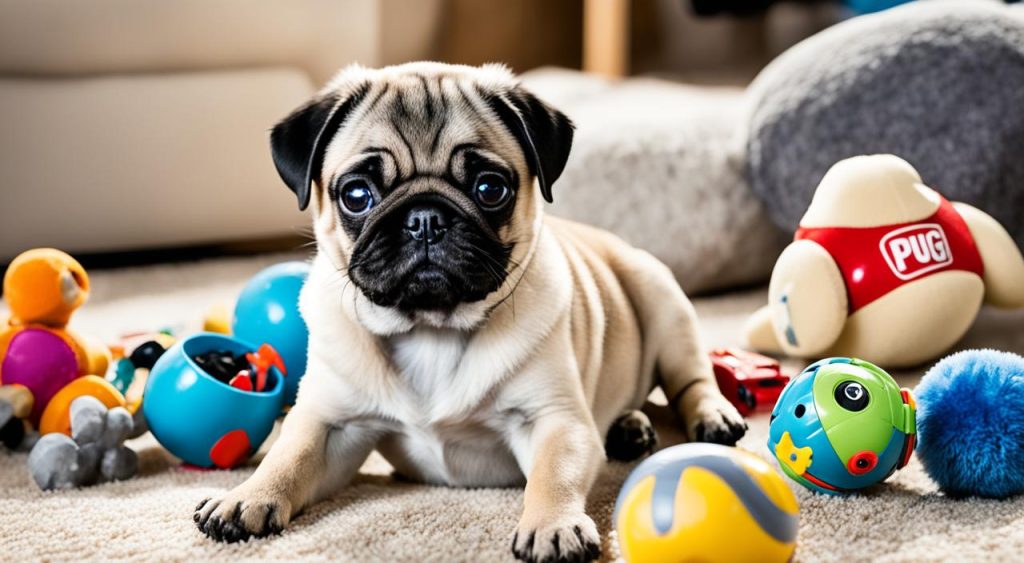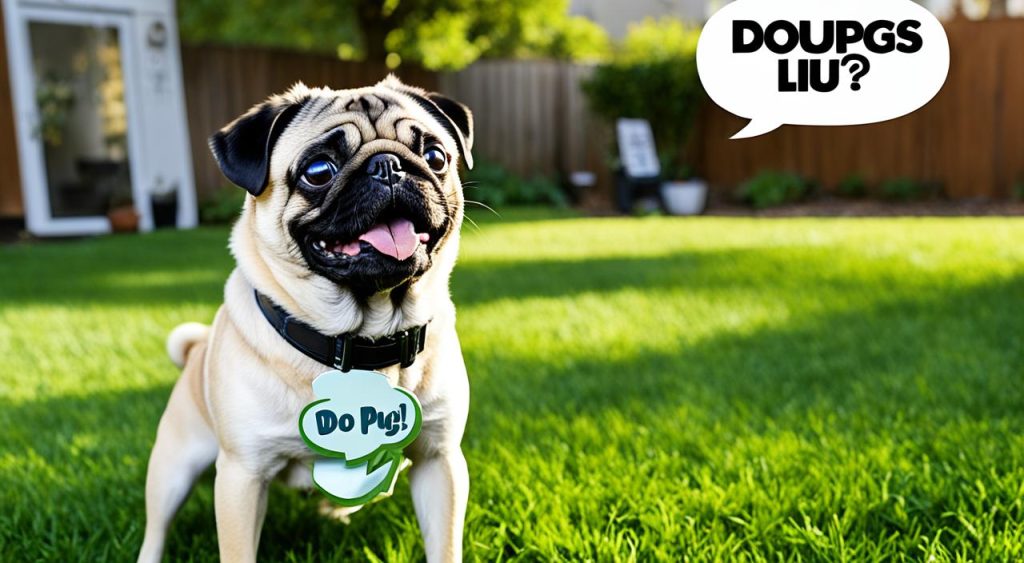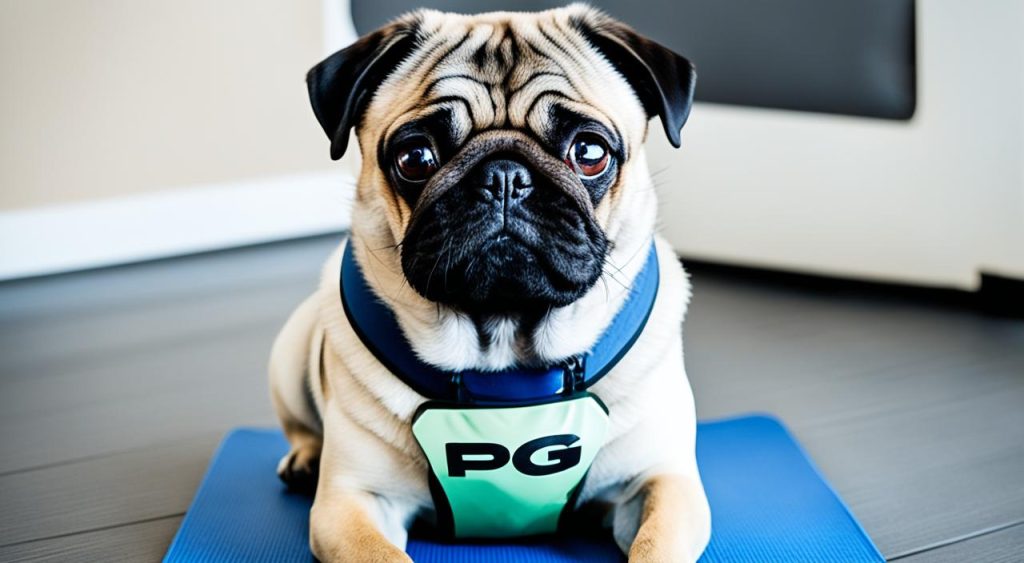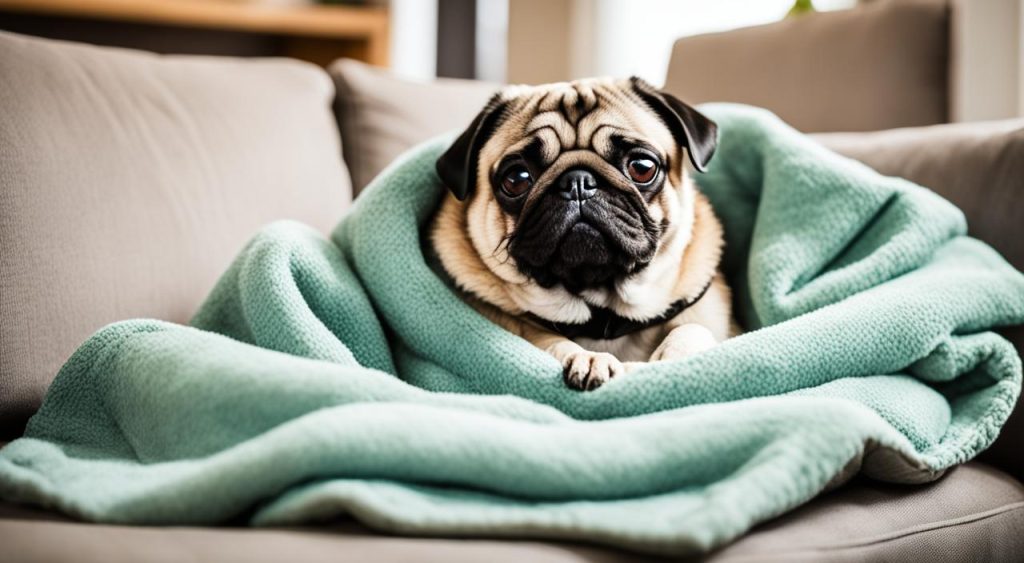Pugs have been beloved companions for centuries, known for their comical faces and affectionate nature. Despite their small size, many people wonder if pugs have a protective instinct to defend their owners. Let’s explore the behavior and characteristics of pugs to determine if they can truly protect their owners.
Key Takeaways:
- Pugs are known for their comical faces and affectionate nature.
- Despite their small size, people often question if pugs have a protective instinct.
- Pug behavior and characteristics will be explored to determine their ability to protect their owners.
- Physical description, temperament, and protective instincts will be discussed.
- Pugs may have some limitations as guard dogs, but they possess protective qualities that make them valuable companions.
Physical Description and Temperament
Pugs have a distinctive physical appearance that sets them apart. With their short coats, wrinkled foreheads, and curled tails, they have an unmistakable charm. They come in fawn or black colors, adding to their unique appeal. In terms of size, pugs typically stand 10-13 inches tall and weigh between 14-18 pounds. Their compact build and adorable features make them a favorite among dog lovers.
But it’s not just their appearance that draws people to pugs. Their temperament is equally endearing. Pugs are known for their even-tempered nature, which means they are generally calm and balanced in their behavior. They are outgoing and sociable, always ready to make new friends. With their playful and cheerful disposition, pugs bring joy wherever they go.
One aspect that stands out about pugs is their loyalty. They form strong attachments to their owners and expect the same level of devotion in return. Pugs thrive on human companionship and will happily follow you around the house. Their loyalty makes them excellent companions and beloved family pets.
While pugs are generally amenable and easygoing, they can also be headstrong and stubborn at times. This independent streak might require some patience during training, but with consistent guidance and positive reinforcement, they can learn to be well-behaved. Their amiable and playful nature, combined with a touch of stubbornness, make them a delightful and entertaining addition to any home.
Protective Instincts
While pugs may not be the most physically intimidating dogs, they do possess some protective instincts. Pugs are moderately protective of their territory, food, and people. They are alert and will bark to alert their owners of approaching strangers.
However, their friendliness and non-aggressive nature may limit their effectiveness as traditional guard dogs. Their protective instincts are more focused on alerting and warning rather than physical confrontation.
Limitations as Guard Dogs
The small size of pugs can be a significant limitation in their role as guard dogs. Due to their petite stature, pugs may not possess the physical presence necessary to deter potential intruders. Larger breeds are generally more intimidating and better suited for this purpose. Pugs’ small size, while endearing, may not instill fear or serve as a deterrent to trespassers.
In addition to their small size, pugs lack the inherent aggression often associated with guard dogs. Instead of displaying hostility towards strangers, pugs are more likely to exhibit their friendly and social nature. They may even be inclined to befriend unfamiliar individuals rather than display aggression. Their lack of aggression may hinder their ability to discern between friends and foes, making them less ideal for certain guard dog roles.
While pugs may not excel as traditional guard dogs due to their small size and lack of aggression, it’s important to note that they possess other qualities that make them valuable and beloved companions. Despite their limitations, pugs can still provide loyalty, watchfulness, and some degree of protection to their owners. Their devotion and alertness can serve as an early warning system, alerting their owners to potential threats.
Protective Qualities of Pugs
Despite their limitations, pugs possess unique protective qualities that make them invaluable to their owners.
Pugs are known for their unwavering loyalty and will go to great lengths to protect their loved ones. Their devotion and attachment to their owners make them fiercely protective and attentive companions.
Pugs have a keen sense of alertness, often detecting intruders or unusual activities before their owners. They are frequently found barking or becoming vocal when they sense something out of the ordinary, serving as an early warning system.
While pugs may not engage in physical confrontation like larger guard dogs, their protective qualities lie in their ability to provide comfort and peace of mind to their owners through their watchful and vigilant nature.
Training and Socialization
Training a pug to be an effective guard dog may be challenging due to their friendly and non-confrontational nature. Extensive and specialized training may be required to overcome their inherent temperament. Additionally, pugs’ social nature and tendency to get along well with other animals and people may hinder their ability to discriminate between friends and potential threats.
Conclusion
In conclusion, pugs may not be the best choice if you’re looking for a traditional guard dog, but they can still make excellent family pets. Their protective instincts, combined with their loyalty and watchful nature, make them valuable companions. While they may not physically deter intruders due to their small size and lack of aggression, they can serve as an early warning system by barking and alerting you to potential threats.
Pugs excel in providing companionship, and their affectionate nature makes them ideal for families. They thrive on human interaction and are known for their ability to form strong bonds with their owners. Whether you’re looking for a lap dog to snuggle with or a playful companion for your children, pugs can bring joy and love to your home.
Ultimately, the decision to have a pug as a guard dog should align with your specific needs and expectations. If your primary goal is protection, considering larger breeds that are more assertive may be a better fit. However, if you prioritize companionship and a loving family pet, a pug can bring warmth and happiness to your household.

